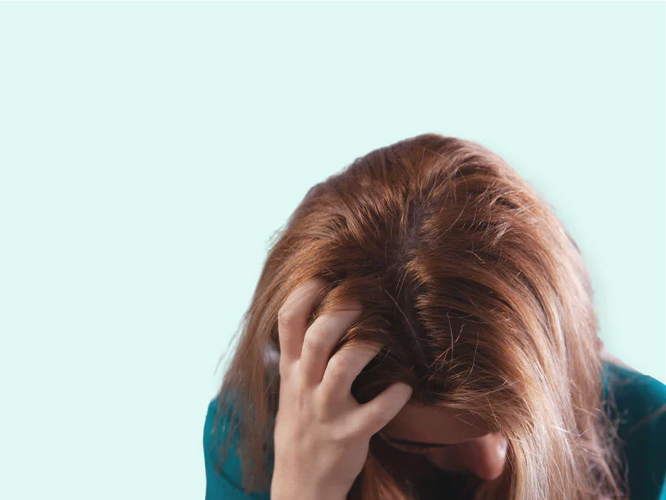When you experience tingling sensations on the scalp, it can have several causes ranging from something innocuous to something that needs more attention. The most common cause is a skin irritation or allergic reaction. If you want to learn about possible causes of a tingling scalp and the best way to treat it, we recommend reading this blog.
View our Scalp Therapy product line
Causes for tingling on the head
Skin irritation or allergic reaction
This is when the skin reacts to a product or substance, which can cause tingling, itching or redness. This is often caused by certain ingredients in hair products. In particular, products containing sulphates, parabens, ammonia or PPD (paraphenylenediamine) can cause allergic reactions. But natural ingredients such as essential oils or plant extracts can also trigger irritation.
Stress as an irritant factor on the head
Anxiety or stress can also cause a tingling sensation on the head. Stress triggers the release of the hormone noradrenaline and other hormones. These hormones are responsible for directing blood flow to the areas in the body that need it. They can send blood to the head, resulting in a tingling scalp. Prolonged stress can also lead to physical tension, including in the muscles around the head and neck. This can also put pressure on nerves, causing a tingling sensation.
Skin conditions causing tingling
Your scalp can also tingle due to irritation. This irritation is often caused by culprits such as dyes, bleaches and hair styling products. Applying heat can exacerbate this irritation.
Psoriasis occurs when skin cells multiply faster than normal, causing patches of dry and flaky skin that can result in a tingling sensation.
Seborrheic dermatitis is a form of eczema that affects the scalp in areas prone to sebum. The eczema can be itchy and burning, and in some cases, lead to redness, inflammation and scaling.
Folliculitis is another skin condition that can cause a tingling scalp. Folliculitis occurs when hair follicles become swollen and inflamed, with bacterial, viral and fungal infections being among the most common causes. In addition to a burning and itchy scalp, it can result in red bumps and skin lesions.
Your shampoo and a tingling scalp
There are shampoos that can irritate your skin. They contain chemicals that penetrate your skin and affect it. Some shampoos contain fragrances or other chemicals that irritate the skin. If you forget to rinse out your shampoo, it can also cause itching. Check which products you are using and what ingredients these products contain. You can find this information on the packaging.

Best treatment for scalp conditions
The recommended treatment for scalp conditions is the Neofollics Healthy Scalp treatment. This treatment addresses dandruff, flakes, itching and is effective for seborrheic eczema and psoriasis. It gently exfoliates the scalp, removing impurities.
The treatment consists of our Exfoliating Shampoo and our Nourishing Mask. Apply the Scalp Therapy Exfoliating Shampoo to your scalp and massage gently using the Neofollics Massaging Shampoo Brush.
After a few minutes, rinse out the shampoo. Then, apply the Scalp Therapy Nourishing Mask to towel-dried hair. Note that you should not rinse out the mask; It should be left in to do its work
Conclusion tingling scalp
A tingling scalp is often the result of stress, irritation or an infection. If you want to treat the tingling sensation on your head, you can use products that actively reduce the effects of these conditions, such as the Scalp Therapy products from Neofollics.













